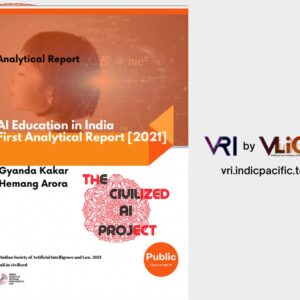This work is licensed under Creative Commons Attribution-NonCommercial-NoDerivatives 4.0 International ![]()
The artificial intelligence landscape isn’t just about technological advancement—it’s fundamentally about power concentration and market control. Our latest comprehensive research, “Artificial Intelligence, Market Power and India in a Multipolar World,” maps exactly how this concentration operates and what it means for India’s economic future.
The Infrastructure Reality Check 🏗️
While everyone debates AI regulation, the real control lies in infrastructure. Microsoft Azure, Amazon Web Services, Alibaba Cloud, and Google Cloud don’t just provide computing power—they shape the entire AI value chain through restrictive contracts that prohibit users from adopting data outputs from one enterprise’s model for training another’s. This creates vendor lock-in scenarios that most businesses don’t see coming.
India’s Unique Position 🇮🇳
Our research identifies India’s distinctive approach: combining state-led strategic planning with community-centric, open-source ethos. Unlike the US market-led model, China’s state-driven approach, or the EU’s regulatory superpower stance, India is forging its own path. But fragmentation between central and state-level AI governance creates inconsistent standards across the country.
The Human Cost of AI Development 💼
The report exposes stark realities: Kenyan data labelers earning $1.32-$2 per hour to make ChatGPT safer, while the Builder.ai collapse revealed how 700 Indian engineers were manually coding apps marketed as “AI-powered” to investors—a classic case of “AI washing” that led to federal investigation and 1,000+ job losses.
Strategic Vulnerabilities and Opportunities ⚡
India imports over 50% of its electronic components, creating critical dependencies. But the ₹16,300 crores National Critical Mineral Mission and four new semiconductor projects (including Tata and HCL-Foxconn ventures) signal serious localization efforts. The challenge: these address packaging capabilities, not advanced logic node fabrication.
Indigenous Knowledge and Data Sovereignty 🌿
Our framework introduces CARE Principles for Indigenous Data Governance (Collective Benefit, Authority to Control, Responsibility, Ethics) and Community Data Trustees concept—granting indigenous communities veto power over their knowledge use in foundation model training. This isn’t just ethical positioning; it’s strategic differentiation in global AI markets.
Regulatory Arbitrage Insights ⚖️
The research reveals how economic law issues are often easier to address than tech law issues from the same B2B transactions—creating opportunities for structuring AI operations to favor more predictable economic regulation over complex technology law compliance.
Market Intelligence for Strategic Planning 📈
Unlike typical academic analysis, this research provides actionable frameworks for navigating AI’s legal-policy intersections. From understanding how cloud contracts affect business freedom to leveraging India’s multilingual capabilities for competitive advantage—it’s intelligence designed for decision-makers, not conference papers.
| IndoPacific.App Identifier | IPLR-SLDA-EXTAI-IG-001 |
|---|---|
| ISBN/ISSN | |
| Author(s) | |
| Publisher | |
| Publication Type | Digital |


![Regulatory Sovereignty in India: Indigenizing Competition-Technology Approaches [ISAIL-TR-001]](https://indopacific.app/wp-content/uploads/2023/02/uiwstqwdd-IPLR-Gmail-ADMIN-300x300.jpeg)
Already on VLiGTA? Log in
Having trouble logging in? Learner help center
This site is protected by reCAPTCHA Enterprise and the Google Privacy Policy and Terms of Service apply.